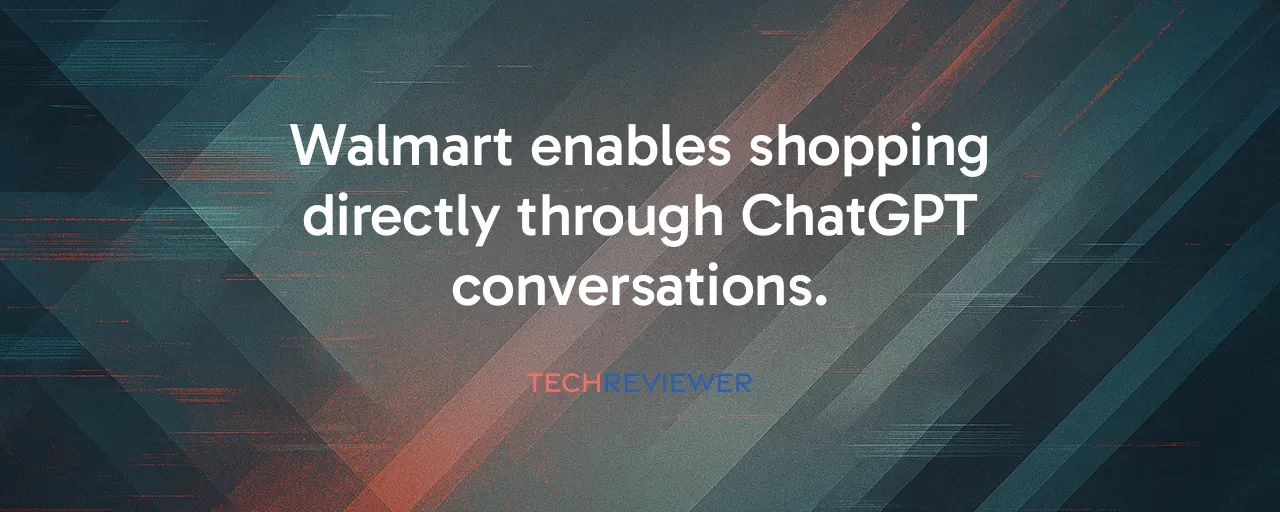A New Way to Shop
Walmart's recent partnership with OpenAI, announced on October 14, 2025, lets customers shop directly through ChatGPT, linking their accounts to browse products and check out without leaving the conversation. This move turns a chat interface into a full-fledged retail channel, making Walmart the first major big-box retailer to implement complete e-commerce transactions through conversational AI. Unlike traditional e-commerce, where you type keywords into a search bar, this system lets you ask for what you need in plain language, whether it's planning a week's meals or finding a last-minute gift. The technology, built on OpenAI's Instant Checkout and the Agentic Commerce Protocol, promises a smoother, more intuitive shopping experience that learns your preferences over time.
What makes this stand out is how it flips the script on online shopping. Instead of scrolling through endless product grids, you can have a back-and-forth with an AI that understands context, like suggesting ingredients for a specific recipe or recommending a jacket suited for your local weather. Walmart's stock jumped over 3 percent after the announcement, reflecting investor excitement about this leap into conversational commerce.
Walmart vs. Amazon: A Retail AI Showdown
Walmart's ChatGPT integration puts it a step ahead of Amazon, which rolled out its Rufus AI assistant in February 2024. Rufus, powered by over 80,000 specialized AI chips, handles complex queries like finding the best dinosaur toys for a five-year-old, but it's still tied to Amazon's ecosystem. Walmart's move, by contrast, taps into ChatGPT's massive user base, potentially reaching shoppers who don't visit Walmart's app or site. Amazon projects Rufus could indirectly boost operating profits by $700 million in 2025, but Walmart's partnership with OpenAI could siphon off customers looking for a more conversational experience.
Etsy's earlier integration with ChatGPT's Instant Checkout on September 28, 2025 offers another angle. After Etsy joined, its stock soared nearly 16 percent, showing how smaller platforms can benefit from AI-driven sales channels. Walmart, however, brings scale to the table, integrating its vast inventory and fulfillment network. The lesson here is clear: conversational AI works best when paired with robust logistics, something Walmart has honed for decades, while smaller players like Etsy rely on niche appeal.
The Power of Open Standards
At the heart of this shift is the Agentic Commerce Protocol, an open-source standard developed by OpenAI and Stripe. Released under an Apache 2.0 license, it lets retailers maintain direct customer relationships while plugging into AI platforms. Merchants control payments, order approvals, and post-purchase experiences, avoiding the trap of becoming mere suppliers to a tech giant. This flexibility has drawn in players like Shopify, with over a million merchants, and Salesforce, which also adopted the protocol on October 14, 2025.
This open approach contrasts with the walled gardens of traditional e-commerce platforms. Retailers can reach ChatGPT's hundreds of millions of users without losing control of their data, a critical asset for personalization and marketing. The protocol's design also supports multiple payment processors and business models, making it a blueprint for future AI commerce ecosystems.
The Catch: Trust and Privacy Hurdles
Despite the hype, conversational commerce faces real challenges. Surveys show 41 percent of Americans don't trust AI shopping assistants, with 34 percent citing privacy concerns and 24 percent worried about inaccurate recommendations. Linking Walmart accounts to ChatGPT requires sharing sensitive data, raising questions about security. Researchers warn that conversational AI can collect extensive user profiles, risking data breaches or misuse if not tightly regulated.
The technology also has practical limits. Right now, ChatGPT's Instant Checkout only handles single-item purchases, which doesn't cut it for grocery hauls or multi-product orders. For users who know exactly what they want, typing a quick search might still be faster than chatting with an AI. These hurdles highlight the need for robust security measures and clearer consumer protections to build trust.
What's Next for Retail's AI Revolution
The conversational commerce market, valued at $41 billion in 2021, is projected to reach $290 billion in 2025, with up to 80 percent of retail interactions expected to involve AI. Walmart's early move could set the standard, but competitors like Target, with its Bullseye Gift Finder, and Instacart, with its AI tools, are close behind. The real game-changer lies in what's coming: multi-modal AI that processes text, images, and voice, or even autonomous agents that shop for you based on learned preferences, as Amazon plans for Rufus.
Still, the shift raises bigger questions. Will AI platforms like ChatGPT become the new retail hubs, sidelining traditional apps and websites? Could data concentration in a few tech giants spark regulatory pushback? Walmart's bold step marks only the beginning and signals a future where shopping feels more like a conversation than a chore.
